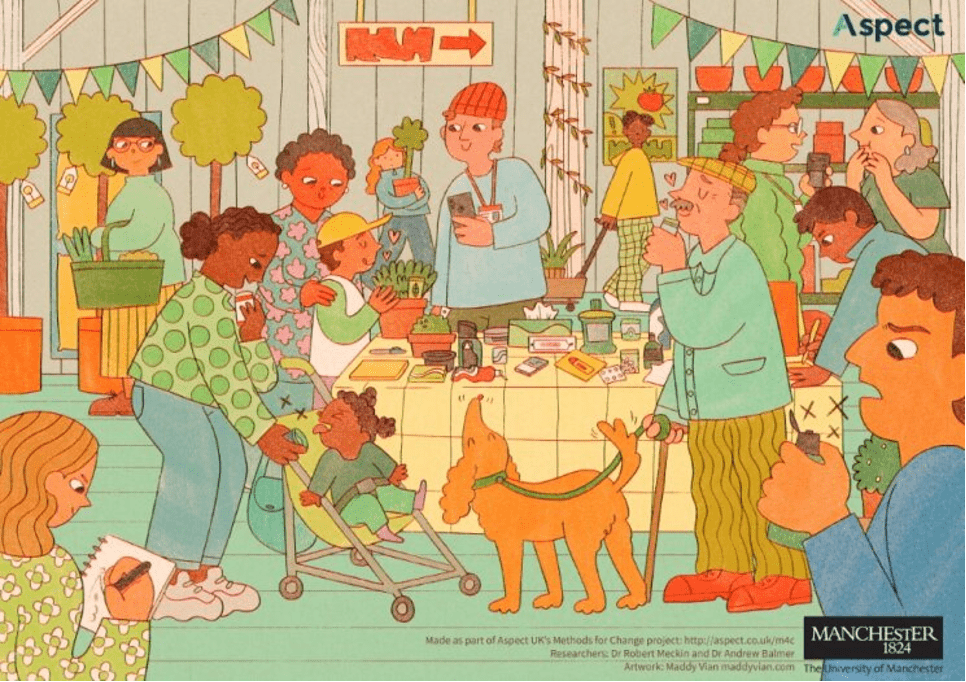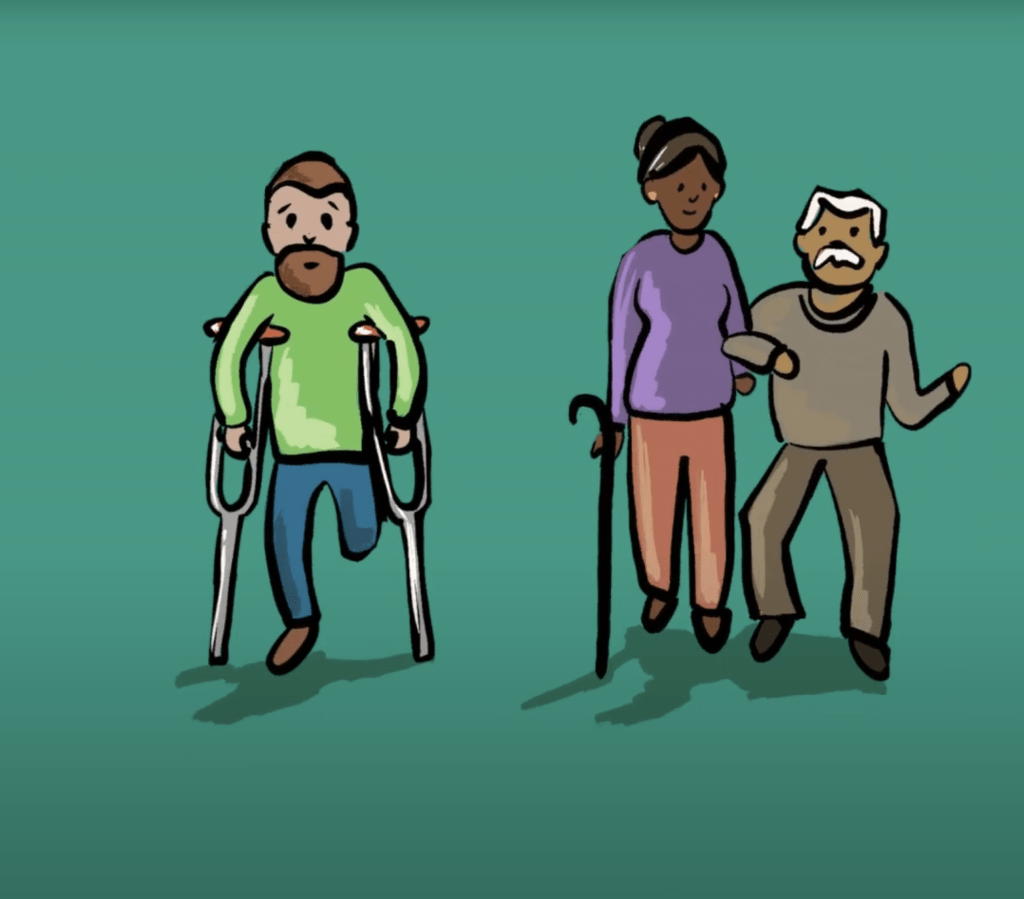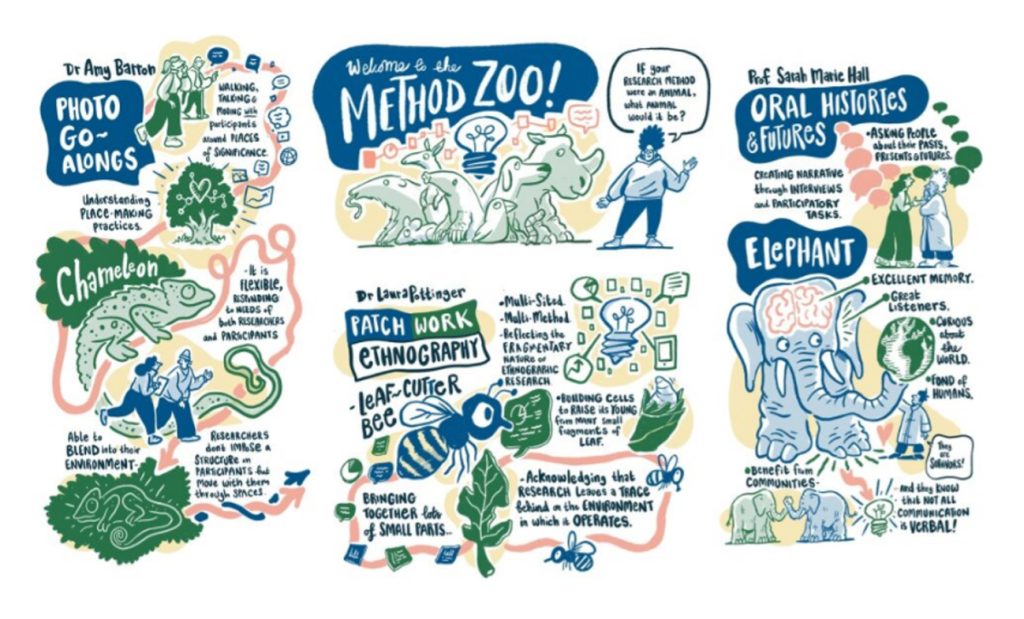Communicating Methods and Change Creatively
Across Phase 1 (2020 – 2021) and Phase 2 (2022 – 2023), the project sought to highlight the value and transformative potential of social science methods to the wider world. This entailed sharing the potentials and practicalities of carrying out social science methods with diverse audiences, in a variety of creative ways, and thinking carefully about how methods in themselves can create or contribute to social, economic, environmental, or political change. Across both phases of the project the M4C team worked collaboratively with 59 contributors to produce a series of 47 accessible ‘how-to’ guides, each focusing on an innovative, creative, transformative social science method. We covered a wide range of methods including: participatory/co-productive, qualitative, activist, visual, creative, arts, design, policy, critical quantitative, critical spatial, interdisciplinary and mixed methods. Each guide provides a bite-sized overview of a method used in the social sciences, case study examples from real-world research, and ideas for how these methods could be used in future in different sectors. The guides are also accompanied by a range of creative outputs (videos, comics, illustrations) that explain and explore each method.
Some of the methods in the 30 ‘how-to’ guides we covered in Phase 1 include visual approaches like Visual Organisational Ethnography, Walk-along Interviews, and Graphic Interviews; participatory methods like Participatory Activist Research and Participatory Film-making; policy-led approaches like The Change Points Toolkit and many more. During Phase 2, we expanded scope to also cover critical quantitative and spatial methods, mixed methods and interdisciplinary methods. We worked with a further 24 authors (22 new contributors) to develop 17 new ‘how-to’ Guides with titles including Critical Spatial Data Science, Designs for Addressing Racial inEqualities (DARE), Making Textiles Together and many more.
The 47 individual guides and accompanying creative outputs from Phases 1 and 2 are available on the ASPECT Research Methods Library. All the guides from Phase 1 are collected into an open access e-Book which is free to download. We reflect on some key findings from Phase 1 of the project in our detailed final report, and in a paper in Geo which summarises the challenges and potentials for communicating the transformative potential of social science methods to diverse audiences, highlighting techniques used in the project for eliciting conversation about methods and their impacts. All the guides from Phase 2 will be available in January 2024 as Volume 2 of the ebook which will also be free to download, and the final Phase 2 report will also become available in January on the Aspect website.
The project would not have been possible without our collaborations with some brilliant designers and artists who supported the development of creative pieces to accompany each guide to communicate methods in visually captivating ways. To profile just a few examples from Phase 2, Rob Meckin and Andy Balmer worked with designer Maddy Vian to create this colourful poster for their method, the ‘Pop-up Stall’.

Alison Briggs worked with designer Caroline Boyd to create an animation to illustrate her method, Remote Ethnography: Mobile Phone Methods.

Jess Adams collaborated with Aude Abou-Nasr to create a video about her method Militant Research. You can view all of the guides and creative pieces via the individual methods pages listed in the ASPECT Research Methods Library.

Researcher Training and Development
Across both phases of M4C the team has been committed to sharing our findings and methods emerging in the project in a range of diverse, engaging and accessible events and training sessions. In Phase 2 these events have included the ESRC Festival of Social Science 2022, where we heard about Critical Spatial Data Science from Caitlin Robinson from the University of Bristol and about Mixed Methods from Aarti Krishnan from the University of Manchester. We supported academics to explore alternative sources of funding to support the uptake of social science and related methods into different sectors using the example of Innovate UK and Knowledge Transfer Partnerships. In September 2023 we hosted a series of Final Showcase Events to Aspect members and professionals within and outside of the academic sector, where our Phase 2 contributors gave presentations about their innovative methods and how they create change. Building on our methods for research-on-researchers (see our Geo ‘Talking Methods, Talking About Methods’ paper), across 2022 and 2023 we held a range of online and in person researcher training and research dissemination events on methods with postgraduate researchers (PGRs), early career researchers (ECRs), early career academics, established academics and professionals.
Building on these research development activities, we are also developing an exciting new online training resource called the ‘Methods Zoo’. The Methods Zoo has been developed across both phases of M4C as a tool for encouraging creative conversation about methods, in interviews, workshops and training for academics at all career stages (see Image 4 for illustrations created for the Methods Zoo by Jack Brougham). The Methods Zoo resource has been trialled as a research development tool both by the M4C team and contributors and colleagues across Aspect member institutions.
Due to be on the ASPECT network website by early 2024, the new Methods Zoo course is aimed at facilitators who would like to host their own creative, interactive workshop exploring the methodological tools used by researchers in M4C. The open access course comprises seven short modules that take learners through the process of planning, hosting, and reflecting on a creative methodological discussion event, offering tips on practical considerations, suggested questions to elicit discussion, ideas for further reading and how to visualise your ‘method-animal’.

Final Reflections
The University of Manchester and a range of existing and additional Aspect Members have agreed to continue supporting Phase 3 of the Aspect programme from 2024 (See here for a list of Aspect members). While the funded period of the Methods for Change project comes to an end, we are currently exploring how we can ensure the materials developed across M4C can be used in non-commercial research, training and teaching. As we look towards 2024, we will release the remaining ‘how-to’ guides and eBook, as well as the Methods Zoo resource. The M4C team are also busy preparing a few journal articles reflecting about the different types of change that methods might facilitate, and how creative and metaphorical thinking can help researchers reflect on the methods they use.
Across both phases of the Methods for Change project we have highlighted many ways that social science, humanities, arts and interdisciplinary methods can create transformative change. This includes, for example, facilitating meaningful relationships between researchers and participants; creating spaces for connection, play and hope; and offering participants a way to get their voices heard by the public or policy makers about things that matter to them. It has been clear across both phases of the project that there’s a high demand from academics and non-academic sectors to communicate the difference that social science methods make.
Most academics within the M4C network already work with partners outside higher education, with their research influencing various societal problems and debates in meaningful ways. Across these sectors – environment, community, social policy and more – there’s strong recognition of the importance of social science theory and conceptual approaches in helping to reframe problems and questions. More traditional views of research impact often imagine the change from research as something that happens when published research findings are taken up and used outside academia. The M4C project has turned this on its head to demonstrate that the way we do research – through the methods we use – matter for creating social transformation.
In taking a particular interest in methods that help us understand and act towards socio-environmental change, social care, and political and economic change, Methods for Change has set out to develop understandings about the relationship between social science methods, impact and practice. In doing so we hope that we’ve created a legacy of thinking, action and outputs that future academics and professionals interested in methods can use to inspire training, teaching and impact across sectors.
Written by the Methods for Change Phase 2 Team: Alison Briggs, Magdalena Rodekirchen, Laura Pottinger, Alison Browne and Sarah Hall.
For more details contact:
Professor Alison Browne
alison.browne@manchester.ac.uk
Professor Sarah Hall
sarah.m.hall@manchester.ac.uk
Dr Laura Pottinger
laura.pottinger@manchester.ac.uk




